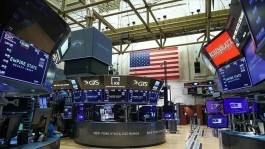Oil prices fell for the fourth session in a row, coinciding with traders’ focus on the postponed meeting of the OPEC+ alliance scheduled to be held this week, in addition to investors’ aversion to risk in the broader financial markets.
The global price of Brent crude oil slipped below $80 per barrel after falling by 2.3% during the past three sessions, while West Texas Intermediate crude oil reached about $75 per barrel. The price of crude oil fell alongside stocks at the beginning of the week's trading, and data also showed a significant slowdown in the rise in profits of Chinese industrial companies during October, highlighting the risks threatening growth in the largest oil importing country in the world.
OPEC was forced to postpone the crucial meeting of the group's ministers for 4 days, until November 30, amid a dispute over oil production quotas.
The recent weakness in crude oil futures prices came despite a Bloomberg survey of traders and analysts, which showed half of them expected the group to take additional measures to reduce supplies in the market.
OPEC+ alliance agreement on oil quotas
The price of Brent crude oil fell by almost a fifth from the highest level recorded in late September due to increased supplies from non-OPEC+ countries, in addition to the disappearance of the risk premium resulting from the war between Israel and Hamas. The International Energy Agency expected earlier this month that the market would return to surplus supply within the next year.
Vivek Dhar, an analyst at the Commonwealth Bank of Australia, said: Saudi Arabia and other OPEC+ members will be keen to avoid any division, and the coalition countries will have to show great discipline in production, or at least their ability to control supplies, to reduce fears of a large surplus in the markets. oil next year.
In a related context, indicators show weak market conditions. The WTI spot spread (which means the difference between the two nearest crude contracts) is 25 cents per barrel in the case of a contago, a bearish pattern in which spot contract prices trade at a greater discount compared to their futures counterpart. A month ago, the gap reached 84 cents per barrel in the case of Backorder, which is the opposite bullish pattern in the case of Contango.
Events in the region affect the oil market
In the Middle East, a chemical tanker linked to an Israeli company was attacked in territorial waters between Yemen and Somalia on Sunday, the latest in a series of attacks on ships with ties to Israel since Houthi rebels (backed by Iran and based in Yemen) threatened to target it. This attack highlights the risks to shipping in this major ship transit area.
In conjunction with this, the UAE is scheduled to host the United Nations Climate Change Conference (COP28), starting next Thursday. The summit will be led by Sultan Al Jaber, head of the state oil company in the OPEC producing country, which raises great controversy around this event compared to other climate summits held in the near term.







































